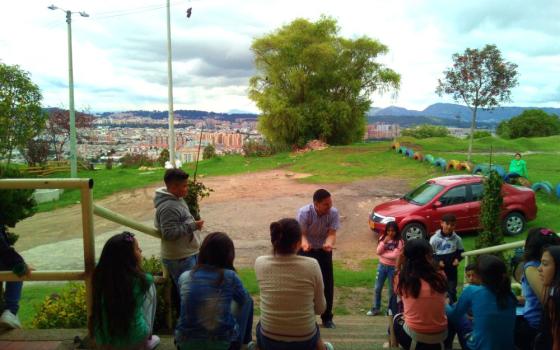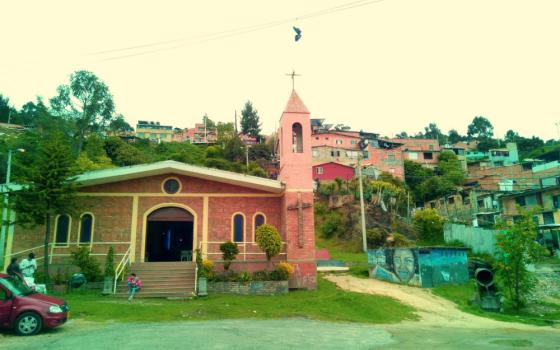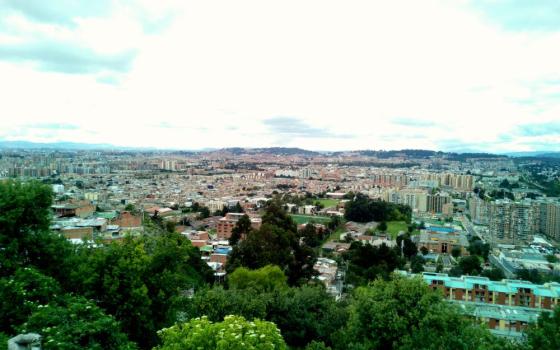Notes from the Field includes reports from young people volunteering in ministries of Catholic sisters. A partnership with Catholic Volunteer Network, the project began in the summer of 2015. This is our eighth round of bloggers: Sarabella Muise is a Good Shepherd Volunteer in New York City, and Julianna Lewis is a VIDES+USA volunteer who just finished her first assignment in Bogotá, Colombia. She will now be in Geneva, Switzerland at her second placement site with VIDES+USA at the Istituto Internazionale Maria Ausiliatrice Human Rights Office which has special consultative status with the United Nations. This is Julianna's fifth blog post. Read more about her.
______
During the last few weeks I was in Colombia before leaving in December, I had an opportunity to visit a neighborhood called Soratama on the outskirts of Bogotá where the Salesian sisters have a ministry. The sisters take their novices-in-training to Soratama and there they work hand-in-hand with the local residents.
The neighborhood is located just five minutes by car from the mother house, Casa Madre Mazzarello, but the difference in lifestyle is shocking. In entering the neighborhood, winding up a steep road getting higher and higher in altitude with each turn, you immediately note a stark change. The houses are close together and somewhat makeshift in their appearance. The streets are small and worn down.
The community is comprised of a diverse group of people of all ages, including local Colombians and many immigrant families from Venezuela. In contrast, the area in which Casa Madre Mazzarello is located is filled with many private high schools, lots of spread-out land, three-lane major roads and shopping malls.
The first Sunday that I went to Soratama, I volunteered with the catechism ministry. The novices prepare local children between 8 and 15 years old for their first Communion through. We started off the morning by playing soccer with the children outside of the church on a field overlooking Bogotá. The view was spectacular and uninterrupted for miles around, setting an incredible backdrop for the morning. Afterwards, the priest began a lesson by sharing the Sunday reading and then discussing it with the children.
At this point, one of the novices asked me to assist her. I thought I might be helping with the lesson or preparing for the next activity. Instead, she had me sit in the back of the church and pray with her for the children preparing for their first Communion. I was frustrated. I came here to be present with the kids and to help in their lesson in whatever way I could. Now, I was isolated from them, sitting far away and simply praying. "I could pray for them at home," I thought to myself. "Why am I wasting the little time I have here in Soratama separated from the young people I came to work with?"
I did not understand at all why the novice was asking me to do this. After we finished praying, I helped set up for the Mass that the priest celebrates for the community every Sunday. I was able to visit with the kids before Mass and talk with them briefly about what they had learned that day. After Mass, the novice, priest and I said our goodbyes and headed back to our nearby home just down the mountainside.
The following week, I decided to go back with one of the sisters to Soratama. This time, I worked with their subsidized food program. Many of the residents in Soratama are either unable to navigate the steep winding roads to purchase their own food due to age or physical condition or are simply unable to afford basic food staples because they are unemployed or are living below the poverty line.
To help ease the problems, the sisters deliver subsidized food packages to residents. I accompanied the sisters in the delivery of these boxes and met many of the program's beneficiaries. During the delivery of the foods, the sisters spend time with each of the recipients. They spend about 30 minutes to an hour with each person they deliver to, checking in on life, health and sharing in prayer with the person.
The first person we met was an 84-year-old woman named Salina who lived alone in a sheet metal-roofed house. Her living space had one small room enclosing both the kitchen and bed and another small alcove made of cardboard, disjointed wood planks and a rusty metal roof for the bathroom.
We sat down with Salina and began conversing about her health and her life. She told us of her living alone and that she has only one person, a neighbor, who checks up on her every couple of days. She is not able to walk too well and spends most of her time alone in her house. She makes every effort to get out of the house once a week on Sundays, to attend Mass with the sisters. She loves that. She told us that she is really lonely and is scared that she will pass away alone. This saddened me. We prayed with her and after our hour-plus visit, we left to make the next delivery.
I still think about Salina and each of the people we met in Soratama. Each of them had their own unique struggles. Loneliness or struggling to stay in school or being unable to afford medication or a procedure, the community members of Soratama face many hardships. And reflecting on my experiences with the people of the neighborhood, I have come to better understand the situations that had originally frustrated and saddened me.
I learned that I, along with everyone else, am limited as a human being. I am simply unable to help everyone I encounter in my life. And that is okay. Having limitations is not a bad thing. Rather it allows us to entrust what we cannot ourselves do or fix to God.
At first, sitting in the back of the church praying and not being able to interact with the children seemed pointless and even a waste of a trip up to the neighborhood. Now, however, I understand why the novice asked me to do this. I came to realize that since I was only able to visit this neighborhood twice, the best contribution that I could make was my prayer.
Living with the Salesian sisters at Casa Madre Mazzarello taught me the importance of "wasting" time in prayer, especially in the modern age. Being limited is a good thing. We live in a world in which many are expected to balance work, family, friends, service and schooling. Moreover, we live in a culture in which saying "no" to opportunities comes with the "fear of missing out" or appearing to not have every aspect in life balanced.
Let us remember that we are limited. We may want to do everything and help everyone ourselves, but we do not have to. That is not a role we have to fill ourselves. It is why we have a Savior.
[Julianna Lewis is a VIDES+USA volunteer working with Salesian sisters in Bogotá, Colombia.]



